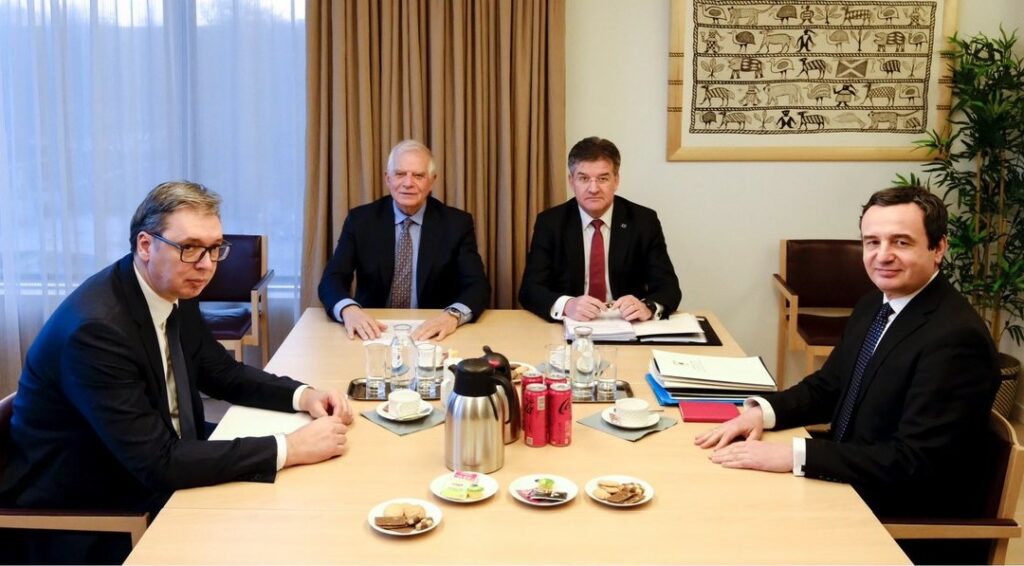The high-level meeting last Wednesday between EU’s foreign policy chief and the leaders of Kosovo and Serbia did not succeed in moving the dialogue forward despite some achievements during the current mandate period.
The meeting took place under the shadow of the European Council and was the 11th dialogue meeting with the parties according to High-Representative Josep Borrell. This time he met them separately because Kosovo objected against a trilateral meeting.
In his press remarks after the meeting, Borrell said that the Belgrade-Pristina dialogue had been stalled for two years when he took over. While listing the achievements since he took over, with the support of a special representative for the dialogue and other Western Balkan regional issues, he admitted that the dialogue had stalled again at the end of his mandate period.
On the positive side, he highlighted the implementation of energy agreements, the abolition of entry-exit documents, and the mutual recognitions of license plates, allowing for free travel between Kosovo and Serbia. But his main project, the implementation of the agreement to normalise the relations between the two countries and pave the way for their EU membership, has completely stalled.
He but the blame on both countries for the failure. “Both parties bear the responsibility for not fulfilling what they promised to do. The non-implementation is a huge lost opportunity for both parties.”
“The discussions were – as expected - as difficult as [they] always have been and, in the end, there was no trilateral meeting,” he said. “Kosovo was not ready for this. Kosovo was not willing to do this trilateral meeting. Serbia was ready to do it. But you need two to dance tango, and you need two to sit around the table in order to continue the dialogue.”
“Silent diplomacy is always helpful and this is what the representative should and will be doing but he or she also needs a strong mandate and the backing of the US behind the scene, as has been the case,” a Western Balkans dispute settlement expert told The Brussels Times on the condition of anonymity.
Judging by Josep Borrell’s own explanation, it appears that Kosovo’s Prime Minister Albin Kurti had three reasons not to meet Serbia’s President Aleksandar Vucic.
First, the agreement has not been signed by the two countries. From the very start, the External European Action Service (EEAS) was of the opinion that the agreement was legally binding and did not require the signature of the two parties, especially after it became part of the benchmarks and commitments of the two countries in their accession path to the EU.
Second, in December 2023, ca 10 months after the agreement had been presented to the two parties, a former Serbian prime minister sent a letter to the EEAS, claiming that the agreement was “acceptable only in a context that does not concern the de facto and de jure recognition of Kosovo.” This is the very essence of normalisation but the Serbian president has not distanced himself from the letter.
For the time being, there are five EU member states that have not recognized Kosovo (Spain, Slovakia, Cyprus, Romania, and Greece). This is hardly consistent with the normalisation agreement. The issue of the alignment of the candidate countries with the EU’s foreign affairs and security policy was discussed at the foreign affairs council meeting last Monday and applies also to member states.
Third, Kosovo’s request to hand over a Kosovo Serb separatist and his “paramilitary-terrorist group to Kosovo’s judicial authorities”. By this, the High Representative was referring to the incident on 24 September 2023 when a group of armed men attacked Kosovo policemen and then barracked themselves in the Serbian Orthodox monastery in Banjska.
The men had crossed the border from Serbia and/or were armed with weapons reportedly manufactured in Serbia. The EU immediately demanded an investigation of the incident. Asked who should carry out the investigation, Peter Stano, EU’s lead spokesperson for foreign affairs, replied that it had to be done by the Kosovo authorities because the incident had taken place in its territory.
The findings regarding the possible participation of men and weapons from the Serbian side should hopefully be included in the investigation report, he added. This would, it seems, require both countries to be involved in the investigation. The findings have until now not been shared with the EU.
M. Apelblat
The Brussels Times

